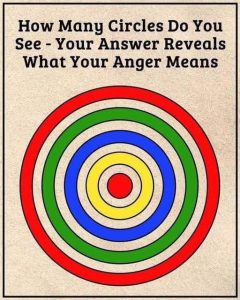Few things capture attention on social media quite like those fast, eye-catching “personality tests” that promise to reveal something deep about who you are—just by looking at a picture. Among the sea of memes, trending posts, and viral videos, one image has made its rounds countless times: an optical illusion of concentric circles accompanied by the bold claim, “The Number of Circles You See Determines If You’re a Narcissist.” Chances are, you’ve seen it. Maybe you paused your scrolling for a second, counted how many circles you could spot, and raised an eyebrow. Maybe you even tagged a friend with a laughing emoji or challenged them to take a look. It’s a simple concept, but it sparks a powerful response. Why? Because deep down, most of us have an undeniable desire to understand ourselves better—and maybe even understand others along the way.

It’s this curiosity that fuels the popularity of such content. Whether it’s a playful quiz that tells you what kind of pizza matches your personality or a more traditional psychological tool like the Myers-Briggs Type Indicator, people love to explore what makes them tick. Personality tests have been around for decades in one form or another. Some are rooted in science, backed by years of psychological study, while others are purely entertainment. But even the most lighthearted ones serve a purpose: they tap into our human longing to feel known and understood. They offer us a mirror—sometimes flattering, sometimes uncomfortably accurate—to reflect on who we are, how we behave, and how others might perceive us.
Take that “How Many Circles Do You See?” meme, for example. While it doesn’t come from any legitimate psychological framework, it’s shared with the kind of intensity usually reserved for breaking news. There’s something both humorous and fascinating about the idea that something so minor—a number of circles—could supposedly indicate a major personality trait like narcissism. Even if you don’t believe it, the temptation to test yourself is hard to resist. And for many, these kinds of “tests” are a social activity. You don’t just take it quietly—you send it to friends, compare answers, and joke about who’s secretly a narcissist.
But while the viral aspect is lighthearted, the underlying subject—narcissism—is anything but. In psychological terms, narcissism refers to a personality trait characterized by an inflated sense of self-importance, a deep need for admiration, and a lack of empathy for others. At its most severe, it’s diagnosed as narcissistic personality disorder (NPD), a condition that can lead to significant issues in relationships, work, and overall well-being. Yet in pop culture and casual conversation, narcissism is often thrown around more loosely. We use it to describe a selfie-obsessed acquaintance or a co-worker who always dominates meetings. That’s part of what makes memes like the circle-counting one so appealing. They give us a chance to discuss serious topics in a more digestible, even comical, way.
Still, it’s important to recognize the limitations of these viral “tests.” While they’re entertaining and can sometimes even prompt self-reflection, they’re not scientifically valid. You won’t learn anything clinically accurate about your personality based on how many circles you see or what color you pick in a random quiz. These are not substitutes for real assessments or conversations with professionals. However, that doesn’t mean they’re useless. In fact, they can serve as conversation starters or entry points for deeper exploration. If a meme sparks someone’s interest in learning more about their personality, mental health, or how their behavior affects others, that’s a win.
It’s also worth considering the broader context in which these types of content go viral. In a world where people are increasingly isolated, particularly in digital spaces, personality quizzes and memes offer connection. They create moments of shared experience, a reason to comment on someone’s post or slide into a friend’s DMs. They allow people to laugh together, agree or disagree, and in some cases, even open up about deeper issues. And let’s face it: in a time when social media is saturated with negativity and stress, a little bit of playful introspection can be a welcome change.
Moreover, we shouldn’t underestimate the role of algorithms and user behavior in pushing this kind of content. Posts that trigger emotional reactions—whether it’s curiosity, humor, or even indignation—tend to get shared more. The more people engage with a meme, the more platforms like Facebook, Instagram, or TikTok are likely to promote it. And because personality tests are inherently engaging (everyone wants to know what their result says!), they’re prime candidates for going viral.
But here’s the takeaway: while it’s fine to enjoy these quick personality memes and tests, it’s best to treat them like what they are—fun, not fact. If you find yourself thinking deeply about a result, take that as an opportunity. Maybe it’s time to explore that part of yourself further through reading, journaling, or even talking to a therapist. The digital age offers us so many ways to reflect, grow, and connect. A silly meme might just be the beginning of a more meaningful journey of self-discovery.
So the next time you see a post claiming that the way you draw a tree reveals your deepest fears or that your favorite ice cream flavor says something about your leadership style, go ahead—take the quiz, share it with your friends, and have a laugh. Just remember: real self-awareness doesn’t come from how many circles you count. It comes from the honest work of looking inward and being open to what you find. That’s the true test—and there’s no app or meme that can do it for you.





